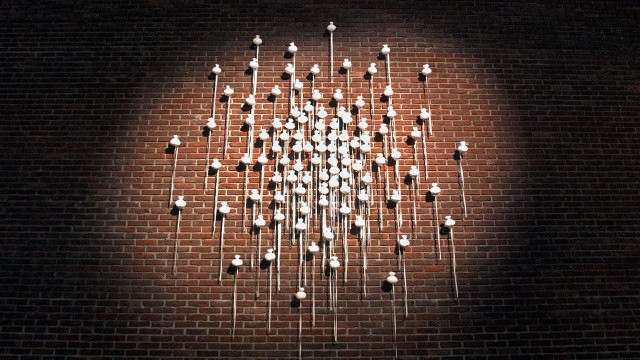
Evoking The Ephemeral
Of the subjects that preoccupy Younes Rahmoun, death occupies an important place. This research, which, in the manner of seventeenth century vanitas, seeks to emphasize the ephemeral nature of life, appears in an important series of works made with fabric from shrouds. In 2001, the artist devoted Abiyyad (White), an exhibition at the Institut Français to this subject. One of the exhibited works is named Layssa Lilkafani Joyoub. It refers to the Arab proverb that can be translated as “a shroud has no pockets,” a true momento mori that emphasizes the vacuity of material goods and the brevity of life. The artwork is presented in the form of a folded, white piece of fabric, modestly placed on a wooden shelf. It evokes the Moroccan tradition according to which each home has a shroud, ready to be used in case of death.
In 2003, Younes Rahmoun created the works Rayhan-Ramad, Rayhan-Jir, and Jir-Ramad, alternating rectangles of myrtle, lime, or ash with the dimensions of tombs intended for corpses. In northern Morocco, women sell myrtle in the area around cemeteries for decorating tombs. Here, this green plant, which eventually becomes dry and brown, initiates a dialogue with the unchanging grey of the ash and the white of the lime, alluding respectively to cremation and the color used to paint tombs.
That same year, at the De Warande Cultural Center in Turnhout, Belgium, the artist created the installation Intifada, made of ninety-nine bundles of shrouds arranged in a circular form on a red brick wall. The artist made these bundles by compressing the fabric to the size of one’s palm, recalling the way in which the Sudanese wear their shrouds as turbans on their heads. Younes Rahmoun declares:
I am looking to speak about death in a way that is not tragic because, for me, death is part of a whole composed of birth and rebirth. Death is a threshold situated within the order of things and it permits passing from an ephemeral life to an eternal life. When I work with this theme, I actually hope to evoke the value of life and of the present moment. We are preoccupied with amassing goods and accumulating experiences, but we don’t give enough time to those whom we love, to people in general. We are rather selfish. To evoke death is a bit like ringing a small bell that reminds us of the here and now: we are here.

